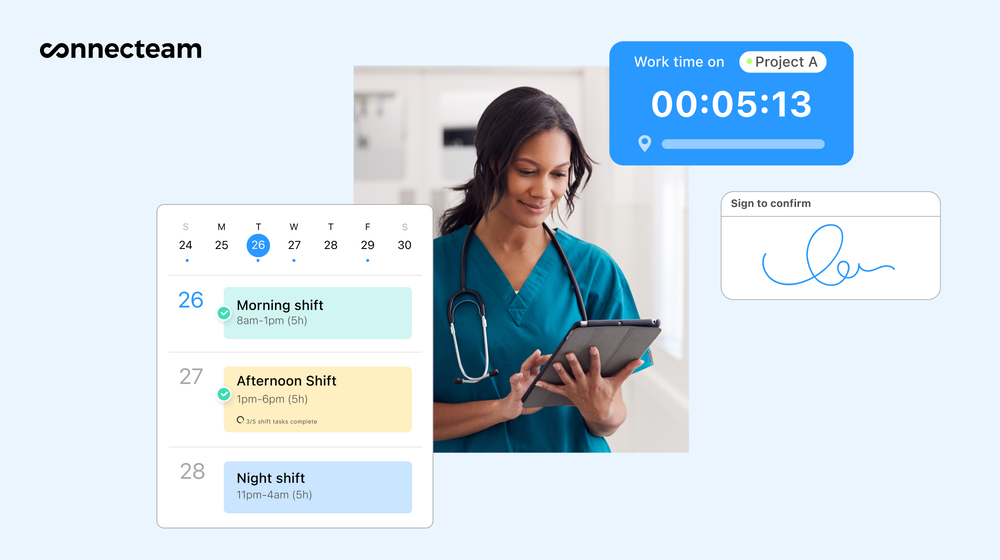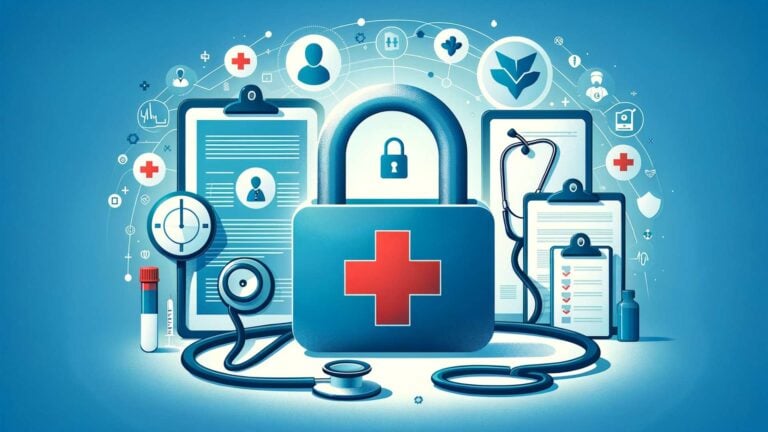Learn about the basic tenets of HIPAA and some of the most common violations with real-world examples.
In 2023, the Department of Health and Human Services (HHS) Office of Civil Rights (OCR) reported that it had investigated almost 350,000 HIPAA privacy rule violations over the course of 20 years.
Yet many healthcare staff still don’t know exactly what constitutes a HIPAA violation, and not all workplaces provide the necessary training.
Employees may not be aware of the penalties for violating HIPAA, which can include steep fines and possible jail time.
To avoid these penalties, your team must comprehensively understand what defines a HIPAA law violation.
What is HIPAA?
The Health Insurance Portability and Accountability Act (HIPAA) is an American healthcare law enacted in 1996 intended to expand Americans’ access to healthcare, combat fraud, and protect the confidentiality of patients’ medical data.
While HIPAA is an incredibly complex law, 5 primary rules guide this policy:
- Security Rule: Covered entities and third-party contractors must implement physical, technical, and administrative safeguards to protect private health information (PHI).
- Privacy Rule: Entities are prohibited from disclosing a patient’s personal health information without their consent.
- Breach Notification Rule: Organizations must report a data breach within 60 days.
- Omnibus Rule: HIPAA-covered entities must provide patients with their health records upon request.
- Enforcement Rule: This rule sets out the procedures for investigating complaints and violations, as well as the process for assessing fines and penalties for non-compliance.
Why is HIPAA Important?
While protecting patient privacy is a cornerstone of HIPAA’s importance, its benefits extend far beyond. Let’s take a closer look at how HIPAA impacts various stakeholders and fosters a more robust healthcare ecosystem:
For Patients:
- Empowerment and Control: HIPAA gives patients legal rights to their medical records, allowing them to access, copy, and request corrections. This empowers them to actively participate in healthcare decisions and hold providers accountable.
- Increased Trust and Transparency: Strict privacy regulations build trust between patients and healthcare providers, encouraging open communication and honest sharing of medical information. This can lead to better diagnoses, treatment plans, and overall healthcare outcomes.
- Reduced Discrimination: HIPAA safeguards individuals from discrimination based on their health information. Insurance companies cannot deny coverage or charge higher premiums based on pre-existing conditions, protecting patients from financial burdens and promoting equal access to care.
For Healthcare Providers:
- Streamlined Administrative Processes: HIPAA standardizes data formats and communication protocols, simplifying processes and reducing administrative burdens for providers. This allows them to focus more on patient care and less on managing intricate compliance issues.
- Reduced Fraud and Abuse: By enforcing strict security measures and data-breach reporting requirements, HIPAA helps combat healthcare fraud and abuse. This protects patients and providers from financial losses and ensures resources are directed towards legitimate healthcare needs.
- Improved Quality of Care: HIPAA’s privacy protections encourage patients to be more open and honest with their providers, leading to more accurate diagnoses and effective treatment plans. This ultimately benefits the quality of care delivered by healthcare professionals.
For the Healthcare Industry:
- Competition and Innovation: HIPAA’s standardized data formats and privacy regulations foster a competitive environment for healthcare technology companies. This encourages innovation in areas like electronic health records, data analytics, and personalized medicine, ultimately benefiting patients and the healthcare system.
- Public Health and Research: HIPAA allows for responsible sharing of de-identified healthcare data for research purposes. This data can be used to track disease outbreaks, identify trends in healthcare utilization, and develop new treatments and preventative measures.
- Economic Stability: By minimizing fraud and abuse, protecting patients from discrimination, and promoting trust in the healthcare system, HIPAA contributes to the overall financial stability of the healthcare industry. This allows providers to thrive and patients to access affordable, quality care.
As you can see, HIPAA’s significance goes beyond protecting patient privacy.
It is crucial in empowering patients, ensuring provider accountability, fostering innovation, and contributing to a stronger, more ethical, and efficient healthcare system for everyone.
This Might Interest You
Considering starting your own business in the healthcare industry? Check out our article on How to Start a Healthcare Business for a complete guide on getting your new venture off the ground.
Who is Required to Comply With HIPAA?
Simply put, anyone who handles or has access to private health information is required to follow HIPAA laws. This includes those working in:
- Hospitals
- Private doctor clinics
- Health insurance companies
- Healthcare clearinghouses
- Third-party service providers, also referred to as business associates, that contract with healthcare organizations and may have access to PHI.
Did You Know?
Healthcare practitioners are even required to keep patient information confidential from family members unless given authorization by the patient. However, in the case of minors, parents are considered ‘personal representatives,’ and HIPAA does not apply.
9 Common HIPAA Violation Examples
Due to the complex nature of the law, there are many different types of HIPAA violations.
To give you a better overview, below are 9 of the most common examples of HIPAA violations, with real-world examples:
Accessing healthcare records without authorization
A person who views someone’s healthcare records without authorization is automatically in violation of HIPAA. For example, if a healthcare professional accesses the records of an ex-partner or a co-worker without any legitimate healthcare-related need, they would be considered in violation of HIPAA.
Real-world HIPAA violation example: In April 2020, St. Joseph’s Medical Center, a non-profit academic medical center in New York, was fined an $80,000 penalty fee for allowing an Associated Press reporter to access the medical records of patients with COVID-19 without authorization from the patients. The reporter then escalated the breach by publishing an article with the information.
Disclosing PHI without permission
A breach of PHI is a serious offense. However, even if unintentional, the offender can still be punished. For example, if a doctor accidentally leaves a patient scan open on their desk and a member of the hospital cleaning crew sees it, the doctor would be in violation of HIPAA.
This issue has gained complexity with the increasing use of social media, particularly TikTok, which has led to uncertainties about what constitutes a HIPAA violation.
Real-world example: A now-former nurse at The Citadel Winston Salem Nursing Facility posted TikTok videos poking fun at mistreating patients. As a result, she was temporarily suspended for inappropriate conduct and possibly violating HIPAA. However, whether she violated HIPAA was debatable since she didn’t directly share private patient information.
Pro Tip
It’s not always clear as to what constitutes a violation, which is why proper training is crucial.
To ensure that your staff fully comprehends HIPAA policies and to keep your organization compliant, it’s crucial to hold refresher training regularly.
With Connecteam, you can take advantage of mobile compliance training to create your own customized training courses. Then, upload them directly into the app so your team can complete them from their mobile devices.
You can use various media types, such as videos and images, and even create quizzes to test your staff’s knowledge retention.
Get started with Connecteam for free today!
Failure to perform a risk analysis
To ensure compliance with HIPAA and safeguard patient privacy, healthcare organizations must perform risk assessments regularly to identify and mitigate potential data breaches.
This should include routinely identifying all security and vulnerability threats and having an incident response plan in place if a data breach occurs.
Real-world example: In 2016, Advocate Health Care in Chicago was fined $5.5 million after several data breaches affecting over 3.5 million people. The primary breach involved the theft of four unencrypted computers. According to the Office for Civil Rights (OCR), the healthcare network failed to perform a risk analysis and protect equipment storing sensitive patient information.
Lack of a risk management system
According to the HIPAA Journal, “knowing about risks to PHI and failing to address them is one of the most common HIPAA violations penalized by the Office for Civil Rights.”
While performing risk analyses is crucial, organizations must also solve any potential risks as soon as they are identified. Failure to do so can be costly, both financially and to the organization’s reputation.
Real-world example: In 2013, The University of Massachusetts failed to prevent a malware attack resulting in the disclosure of over 1,670 patients’ PHI. As a result, the university was fined $650,000.
Failure to enter into a HIPAA-compliant business associate agreement (BAA)
A BAA is a legal document between a healthcare provider and a third-party contractor. It ensures the contractor will handle protected health information in a manner compliant with HIPAA regulations. If a healthcare provider does not enter into a BAA, they are in violation of HIPAA.
Real-world example: In 2013, Raleigh Orthopaedic Clinic worked with an outside vendor to transfer X-rays to digital formats. Unfortunately, the clinic did not sign into a BAA with the vendor and was fined $750,000.
Did You Know?
Connecteam is HIPAA-compliant. Once you sign into a BAA, you and your staff can discuss sensitive patient information and store patient documents directly in the app without worrying about data breaches or non-compliance.
Get started with Connecteam for free today!
Denying patients access to their own health records
Providing patients copies of their medical records within 30 days of request is an essential component of HIPAA. Doing so promotes transparency in the healthcare system, allows patients to correct errors, and allows them to share their records freely.
Real-world example: In 2021, a patient accused United Healthcare of refusing to provide a copy of their medical records. While this was attributed to an employee error, OCR still fined the company $80,000.
Insufficient access controls to electric patient health information (ePHI)
While some health providers still rely on paper medical files, most store patient records in management software or patient portals. They may also rely on work communication apps to securely discuss patient information, and healthcare organizations are responsible for protecting this information.
This means that hospitals and clinics need to have a reliable cybersecurity system in place. Data encryption is one of the most common and effective methods for securing patient information, but there are alternatives. Either way, adequate security measures must be implemented to remain HIPAA compliant.
Real-world example: In 2018, the University of Texas MD Anderson Cancer Center faced a penalty of $4,348,000 due to two separate data breaches. The first incident involved the theft of an unencrypted laptop from an employee’s home, while the second incident was related to the loss of two unencrypted USB drives. Both instances resulted in the exposure of sensitive patient information stored on these devices.
Pro Tip
Make sure to use a HIPAA-compliant employee management and communication app that encrypts your data and adheres to the most stringent security & privacy standards, like Connecteam.
Connecteam keeps all employee and patient data safe, secure, and protected from data breaches, ensuring that your team remains compliant with state and federal regulations.
To learn more, visit the Connecteam Trust Center.
Waiting more than 60 days to report a breach
The HIPAA Breach Notification Rule requires all entities subject to HIPAA to notify the appropriate parties of a data breach within 60 days. Failing to adhere to this timeline is one of the most frequent violations of HIPAA.
Real-world example: On October 26, 2015, someone accessed and downloaded over 200,000 patients’ private data from CoPilot Provider Support Services. CoPilot only reported the breach two years later, resulting in a $130,000 fine.
Improper disposal of PHI
All entities must follow specific guidelines for the secure disposal of PHI, and failure to adhere to these standards can lead to potential breaches and legal consequences.
The primary disposal methods recommended by HIPAA include shredding paper records, thoroughly wiping data from electronic devices, using degaussing methods to disrupt the magnetic fields on tapes or disks, or physically destroying the media to prevent data recovery.
Real-world example: In 2015, Cornell Pharmacy in Denver was fined $125,000 for not following proper disposal protocol of medical records. OCR discovered that the records were unsecured, not shredded, and contained protected health information.
Penalties for Violating HIPAA
There are two types of HIPAA violations: civil and criminal.
While civil violations are usually unintentional and accidental, criminal violations result from willful neglect or malicious intent.
The severity of a HIPAA violation penalty will first depend on whether the violation was civil or criminal. Criminal violations result in higher fines and possibly jail time.
Other factors include:
- The extent of the violation, including the type of data exposed and the number of people affected.
- Level of harm caused to patients or individuals whose data was compromised.
- An entity’s history of compliance with HIPAA is taken into account. Organizations with previous violations or a history of non-compliance face higher penalties.
- How quickly an organization responds to a violation
- The presence or absence of effective training programs. A lack of HIPAA training usually leads to higher fines.
- Entities that cooperate with investigators and take immediate steps to rectify violations often face less severe penalties.
Penalties for civil violations
Civil violations are overseen by the Department of Health and Human Services (HHS) Office of Civil Rights (OCR).
The penalty structure is as follows:
| Tier 1 | The violation is attributed to a lack of knowledge and could not have realistically been avoided. | $100 per violation up to $50,000. |
| Tier 2 | The covered entity should have been aware of the potential for a violation but could not prevent it even with a reasonable amount of care. | $1,000-$50,000 |
| Tier 3 | A violation occurred due to willful neglect of HIPAA laws, and the entity has already attempted corrective actions | $10,000-$50,000 |
| Tier 4 | A violation occurred due to willful neglect of HIPAA laws, and no attempt has been made to correct the violation within 30 days. | Minimum fine of $50,000 per violation |
Penalties for criminal violations
Criminal HIPAA violations are prosecuted by the Department of Justice (DOJ), rather than the OCR.
The penalty structure for criminal violations is as follows:
| Tier 1 | When someone knowingly discloses PHI | $50,000 plus up to one year in jail |
| Tier 2 | When someone knowingly obtains PHI under false pretenses | $100,000 plus up to five years in jail |
| Tier 3 | Obtaining PHI for personal gain or with malicious intent | $250,000 plus up to 10 years in jail |
Effortlessly Maintain HIPAA Compliance with Connecteam
Fortunately, there are technology solutions on the market that can help you remain HIPAA compliant and avoid violations.
Connecteam is an industry-leading employee management platform designed to make communication, scheduling, task management, training, and payroll a whole lot easier. What’s more, the app is HIPAA-compliant so you don’t have to worry about data breaches or violations while using the app.

So whether you work for a healthcare organization or contract with one regularly, here’s how Connecteam can help your business remain HIPAA-compliant:
Create your own customized HIPAA training courses for your staff
Ongoing training is a crucial component of preventing HIPAA violations. And according to industry standards, you should provide refresher courses for your staff annually.
With Connecteam’s employee training software, you can create customized training courses directly in the app and make them as detailed as you like. Mix up the training materials and keep employees engaged by adding images, videos, gamification elements, and quizzes to test their knowledge.
Employees can complete courses on their own time from their mobile devices to avoid expensive and timely in-person training sessions.
Protect employee and patient data with 2FA, SSO, and data encryption
Connecteam offers cloud-based document storage where employees can submit certifications, employment documents, and other files in seconds. You can also share patient documents, scans, or any other PHI within the app for streamlined information sharing without worrying about a HIPAA breach.
Connecteam helps you secure employee and patient data with 2-factor authentication (2FA), single sign-on (SSO), and data encryption. You can also set up a password policy requiring employees to use strong passwords for their Connecteam accounts.
Communicate and share data with 1:1 and group messaging
With the user-friendly, fully HIPAA-compliant employee chat app, you can create an unlimited number of individual and group chats and share images, videos, documents, and other files directly through messages.
All chat data is end-to-end encrypted, and you can also set customized user access permissions to ensure that only authorized users can access certain conversations.
For extra security, conversations are saved to the cloud and not on users’ devices. This also prevents staff from downloading or exporting chat data.

Set up user access permissions and monitor data use with audit logs
Connecteam makes it easy to assign role-based access permissions to control who has access to what data. This is crucial for maintaining HIPAA compliance since it ensures that only employees who need access to sensitive health information have it.
You can also create custom groups to control permissions or set permissions individually. Connecteam lets you control who can access different chat channels, documents, and forms.
This Might Interest You
Stay compliant and safeguard sensitive information! Read our in-depth review of the best HIPAA compliance software to ensure your business meets regulatory standards and avoids costly penalties. Plus, explore the best HIPAA-compliant texting apps to securely communicate with your team and clients. Find the right tools to protect your business today!
Connecteam is designed for healthcare organizations of any size
Connecteam isn’t just user-friendly and customizable: it’s also affordable. Basic pricing plans start at only $29/month, and small businesses with under 10 users can use the app’s basic features completely for free.
Note: These prices do not reflect the additional fee of adding HIPAA compliance to an account.
Stay compliant with HIPAA and Prevent Violations
HIPAA violations not only compromise patient privacy but also can result in significant legal and financial repercussions. It’s crucial for healthcare professionals and organizations to strictly adhere to HIPAA regulations to ensure the confidentiality and security of private patient information.
With a HIPAA-compliant employee management app like Connecteam, you can provide regular HIPAA refresher trainings, secure employee communication, and ensure your data is encrypted, reducing the risk of a violation.
Essential HIPAA Resources:
Check out these valuable platforms and organizations to learn more about HIPAA regulations and compliance:
Official Guidance:
- Department of Health and Human Services (HHS) Office for Civil Rights (OCR): The OCR is the primary enforcement agency for HIPAA. Their website is a treasure trove of information, including the HIPAA regulations, guidance documents, FAQs, and enforcement activities. Visit https://www.hhs.gov/programs/hipaa/index.html.
- HealthIT.gov: This HHS website offers helpful resources and tools specifically designed for healthcare providers navigating HIPAA compliance. Explore https://www.healthit.gov/.
Compliance Support:
- HIPAA Journal: Stay updated on the latest HIPAA news and compliance updates with this trusted online publication. Access articles, webinars, and resources at https://www.hipaajournal.com/.
- American Health Information Management Association (AHIMA): This professional association provides comprehensive HIPAA compliance resources, educational materials, and certification programs for healthcare professionals. Learn more at https://www.ahima.org/.
Training Providers:
- HIMSS Privacy and Security Academy: HIMSS offers a variety of online and in-person HIPAA training programs designed for healthcare professionals of all levels. Discover options at https://www.privacysecurityacademy.com/.
- HealthStream: This leading healthcare training provider offers HIPAA compliance courses and educational resources tailored to specific roles and healthcare specialties. Explore their offerings at https://www.healthstream.com/.
FAQs
What is considered a HIPAA violation?
A HIPAA violation occurs when there’s a breach of the Privacy, Security, or Breach Notification Rules set by HIPAA. This includes unauthorized access, disclosure, or use of Protected Health Information (PHI), failing to secure PHI from unauthorized access, not providing patients access to their records, or not reporting PHI breaches promptly. Such violations can lead to significant penalties in the healthcare sector, emphasizing the importance of HIPAA compliance for patient privacy protection.
What is a HIPAA breach?
A HIPAA breach is an incident where Protected Health Information (PHI) is used or disclosed in a manner not permitted by the HIPAA Privacy Rule, potentially compromising the security or privacy of the PHI. It’s a breach unless proven otherwise by demonstrating a low probability of PHI compromise. These breaches can range from minor incidents to large-scale data leaks, and are critical in the landscape of healthcare information security.
What is an example of a HIPAA violation email?
An example of a HIPAA violation through email could involve sending PHI without proper encryption or to an unauthorized recipient. For instance, a healthcare provider mistakenly emailing a patient’s medical information to the wrong person, or sending sensitive health information without securing the email, constitutes a violation. This highlights the necessity of rigorous email security practices in healthcare communications to safeguard patient data.
What is the HIPAA Security Rule?
The HIPAA Security Rule sets national standards for protecting individuals’ electronic personal health information (e-PHI) managed by covered entities. It demands appropriate administrative, physical, and technical safeguards to ensure the confidentiality, integrity, and security of e-PHI. This rule is crucial for healthcare providers as it provides a flexible framework suitable for various organizational sizes and structures, focusing on the protection of digital health information.
Disclaimer
The information on this website about HIPAA violations is intended to be a summary for informational purposes only. Laws and regulations regularly change and may vary depending on individual circumstances. While we have made every effort to ensure the information provided is up-to-date and reliable, we cannot guarantee its completeness, accuracy, or applicability to your specific situation. Therefore, we strongly recommend that readers seek guidance from their legal department or a qualified attorney to ensure compliance with applicable laws and regulations. Please note that we cannot be held liable for any actions taken or not taken based on the information presented on this website.

